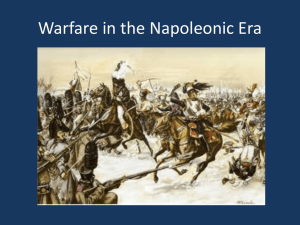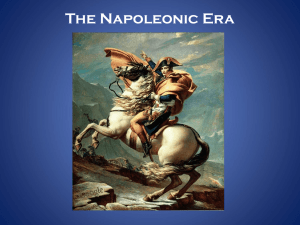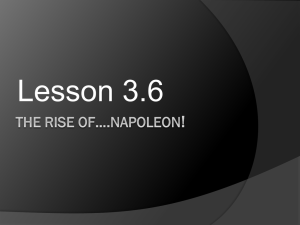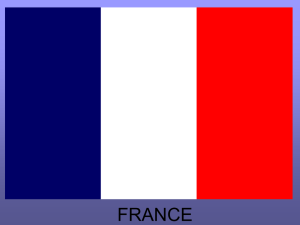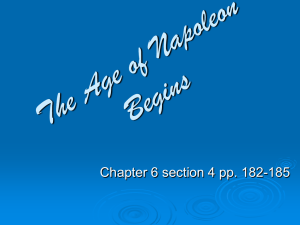The Age of Napoleon
advertisement
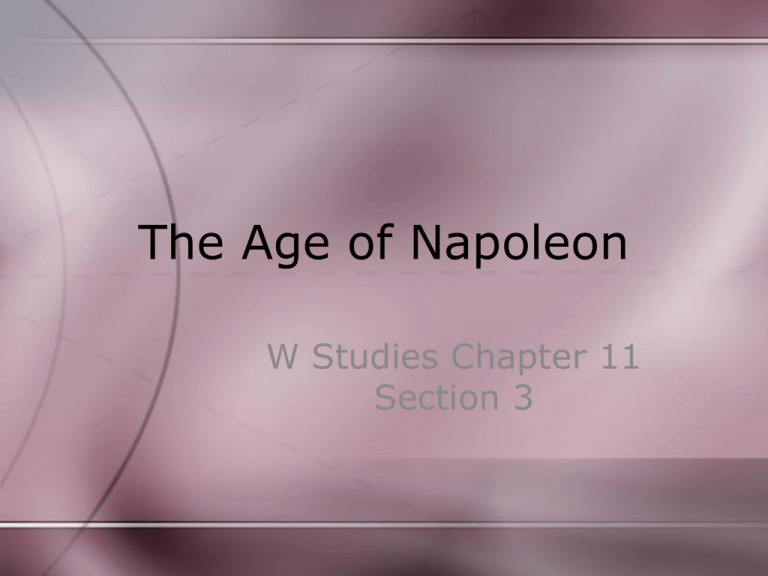
The Age of Napoleon W Studies Chapter 11 Section 3 Napoleon’s Rise • Born on Corsica island; became a lieutenant in 1785 (16 yrs old) – Became Brigadier General at 24; became commander of French forces in Italy 4 yrs later • Extremely effective strategist – speed, deception & surprise • Led force to invade Egypt (Great Britain) failed due to GB’s navy • Returned home & took part in the coup d'état against the Directory – Set up the Consulate – new “republic” in France where Napoleon had complete control • Crowned himself Emperor in 1804 Napoleon’s Rule • Napoleon made an agreement with the Church: Napoleon officially recognizes Catholicism as the religion of France; Pope agreed to let France keep the land it seized – Church became an ally of the consulate; French people who bought church land loved Napoleon • Civil Code – established, written laws for French people – Equality under the law, individual choice in careers, religious tolerance, abolishment of serfdom • Inequality of men and women • Bureaucracy – organization that runs gov’t – Job assignments were based on ability, not nobility or rank in the old gov’t • France’s liberty was slowly replaced with despotism – Napoleon shut down 60 newspapers, banned books, exiled dissidents like Anne-Louise-Germaine de Stael • Criticized Napoleon & called him a tyrant Napoleon’s Empire • Napoleon took over most of Europe – French empire = directly controlled by Napoleon; Dependent States = controlled by his relatives; Allied States = conquered by Napoleon – Napoleon encouraged the spread of Revolution ideals: legal equality, religious tolerance, economic freedom • Destroyed the old order (nobility lost their privileges) led to democratic traditions in all of Europe Europe’s Response • Britain survived against Napoleon & defeated his navy – Created the Continental System to prohibit Europe from trading with GB • Some of Europe still traded; GB also got goods from overseas • Nationalism began to rise in all parts of Europe – Cultural identity of a people based on common language, traditions, and principles – Countries conquered by Napoleon resented the French and wanted to rule themselves • Fall of Napoleon Russia didn’t follow the Continental System Napoleon invaded with 600,000 – Russia refused to fight retreated all the way to Moscow, burning everything as they went • “Great Retreat” back to France was devastating due to harsh winter • Only 40,000 returned • Rest of Europe rose up against Napoleon, defeated him, reestablished a monarchy, exiled Napoleon to Elba – Snuck back into France, took control, and went to war against Europe again • Battle of Waterloo = Napoleon’s final defeat – Duke of Wellington defeated Napoleon’s army, Napoleon was exiled to St. Helena where he died





